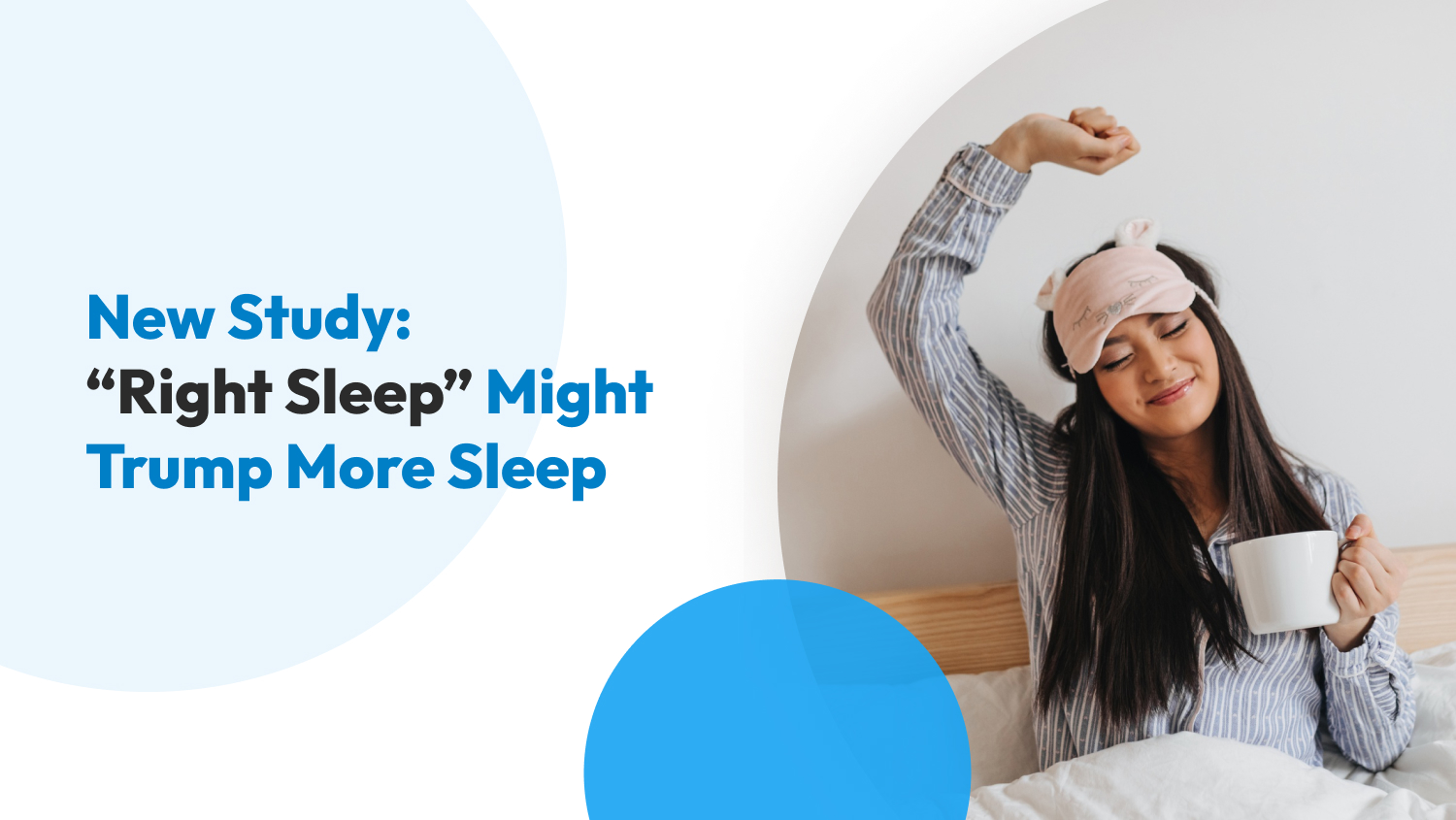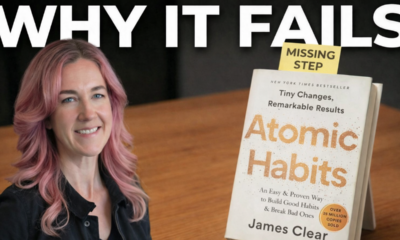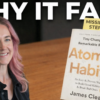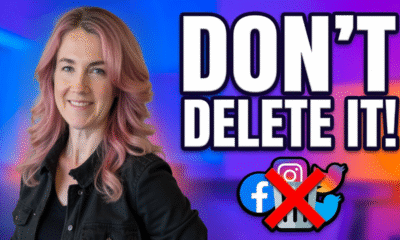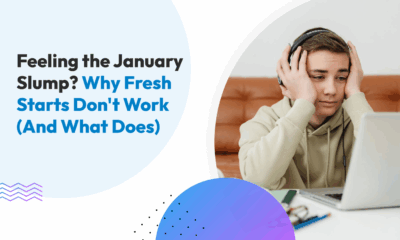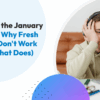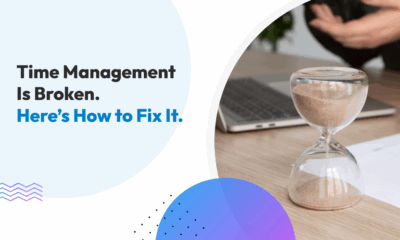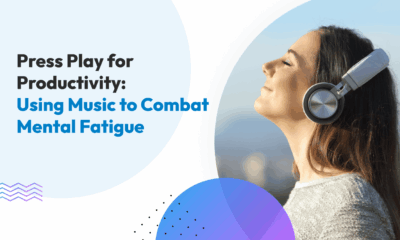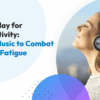Science Says
New Study: “Right Sleep” Might Trump More Sleep
Sleep for Entrepreneurs
Entrepreneurs frequently sacrifice sleep for more hours working on their business – and we might even tell ourselves things like: “I’ll sleep more when this project is complete” or when a revenue goal is hit, a new employee is onboarded, etc. You get the idea. These “when X happens” lies we tell ourselves often leave us exhausted and we’ve all been told we should not walk around sleep deprived and all the dangers that come with it. But what is considered “sleep deprived”? How can we prevent (or mitigate) it and what factors affect the amount and quality of sleep we get?
A recent study explains that it isn’t just that we all should be sleeping 8 hours, it’s a lot more complicated than that and in fact, 8 hours might be too long for you. Long sleep (defined in the study as more than 9 hours), may even be a risk factor for dementia later in life. So if the answer isn’t just “sleep more,” what is it? Let’s break down the latest data on sleep from Understanding the Need for Sleep to Improve Cognition, a study by Ruth L.F. Leong and Michael W.L. Chee.
Right Sleep Vs More Sleep
According to the study, sleep is a lot more complicated than simply getting 8 hours of sleep. Too much sleep in general as well as too much of a sleep phase can be just as harmful as too little sleep. This means that while REM sleep is often discussed, more isn’t always better both when it comes to a given phase and when it comes to the length of sleep in general. Moreover, studies in adolescents who are faced with an early school start time causing reduced sleep, biphasic sleep (sleeping in two phases, one 6.5-hour phase and 1.5-hour nap phase) essentially restored everything from mood to working memory and executive functioning. This is important to note because while the study mentions adolescents specifically, this might hold true far belong adolescence, depending on the individual.
Action item: Consider what Right Sleep might be for you right now and again at the end of the article. By the end, you should have additional action items to use to determine your Right Sleep.
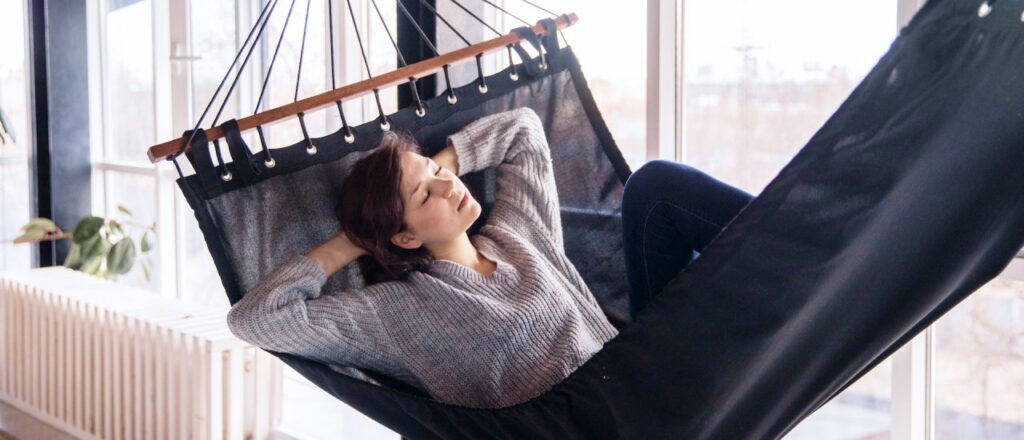
Napping and Quiet Wakefulness
As mentioned above, daytime napping can help offset the cognitive impairments associated with short nighttime sleep. However, in older adults, a short nap of 30-60 minutes is shown to be beneficial for cognition and heart health while naps over 60 minutes seem to hurt more than they help. With that said, you might be more in the “adolescent” range well beyond adolescence and it is important to consider how napping might help (or hurt) your sleep strategy.
The study also discussed “quiet wakefulness” mentioning that some level of recovery does seem to be happening during daydreaming and being awake but in a state of rest meaning that even if napping isn’t an option, there might be some benefit in meditation or other form of quiet wakefulness. While it sounds like it isn’t a full replacement for sleep, in a pinch, it’s worth testing out.
Action item: If you are sleep deprived consider the role naps and quiet wakefulness play. Are you napping too much or too little? Or do you write them off completely? Track your sleep and how much of it comes from nighttime vs. naps and how it makes you feel. Consider forms of quiet wakefulness and whether that strategy feels more doable than short naps.
Sleep is…Social?
While we entrepreneurs might love to see ourselves as 100% in control (or maybe it’s just me?) it turns out that sleep patterns aren’t just influenced by what you do in your home, but by the society you are a part of. For example, in theory, if we go to bed later, we could simply wake up later to achieve the same amount of sleep. Unfortunately, this doesn’t match societal norms for many adults and even school-aged children.
Moreover, the role of napping in society might change. Napping is extremely common in childhood but as we age, it is generally phased out in many societies before returning in older age. Further, if you live in a location that shifts between Daylight Time and Standard Time, you also find yourself having to shift sleep to follow society. This can go even further when it comes to drinks out with clients, for example, or other nighttime activities that might delay bedtime without the subsequent delay in wake time.
Action item: The study mentions that this same concept can be flipped to improve sleep by receiving sleep recommendations generated for people similar to you. Here is the study that this study quotes and it refers to using the recommendations from a wearable that is analyzing data plus it had the added benefit of comparing how you do to others. Wearables are discussed below but even if that’s not your thing, any sort of group where you can inspire each other to take control of your sleep could work similarly. Find 1+ people or a group where you can focus on healthy sleep together.
It’s not just blue light
Frequently, we are told to avoid “blue light” at night and many of us might think this means simply turning off the TV and setting aside our smartphones – problem solved, right? Not quite. This study discusses simply “light” as a factor in sleep. In fact, virtually all light can affect sleep, but different types of light affect sleep differently.
The invention of artificial light (i.e., the lightbulb) has meant that we don’t need to confine our activity hours to daylight hours. We modern humans can work from 9 am to 5 pm anywhere in the world, regardless of what the sun is doing. We can work night shifts and anywhere in between. Meanwhile, our bodies are still stuck on light = awake & dark = sleep. So that means, it won’t just be your computer or TV that is signaling to your body that it’s still time to “stay awake” it could be any bright light at all.
Furthermore, the study explains that the majority of us have a master circadian clock of slightly more than 24 hours and it is kept in check by, you guessed it, light. This is why longer sleep during winter (or perhaps just the desire to sleep longer) is a thing. But while artificial light has the power to ruin our sleep and upset our clocks, it also has the power to help us control it.
Action Item: Test different types of light and varying degrees of darkness or near-darkness for a set period of time before attempting to sleep and record your analysis. For example, does having a lamp on to read a physical book affect your sleep more or less than reading the same book on your smartphone? My testing has revealed that this book light on a physical book and the Kindle Paperwhite at the lowest light setting (and only that setting) does not affect my sleep but almost anything else will.
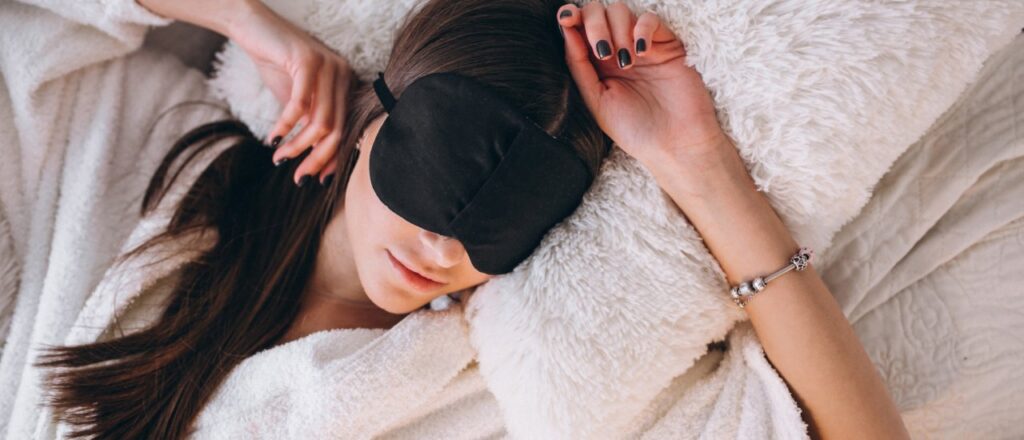
Bedtime isn’t necessarily sleep time
The study differentiates between Time In Bed (TIB) and Total Sleep Time (TST) and it might be useful to track both and in particular to make your TIB in total or nearly total darkness. For example, I have found that I require 9 hours of dark in bed (TIB) to achieve 7.5 hours of sleep (TST), my TIB is equivalent to about 84% TST. However, I also find that reduced TIB does not always equate to 84%. For example, as I write this, last night, I spent 8.5 hours in bed but just 6 hours and 45 minutes asleep, or 80%. I find this to be consistent for my body – which is the primary metric that matters – discussed in more detail below. Having a TIB goal allows me to create an “input goal” for sleep since I cannot simply command my body to sleep exactly 7.5 hours, but instead have to work with the data I have.
Action Item: Start tracking your Time In Bed vs. Total Sleep Time – do any trends stand out? The study mentions that wearables are a new phenomenon giving rise to additional sleep data whereas many previous studies relied on self-reported sleep data.
Wearables
If you aren’t looking for a smartwatch the Whoop is purported to be one of the top performers in sleep tracking and does not have a screen so you definitely won’t be distracted by it.
If that’s not your style but you don’t want a true smartwatch, you can check out Fitbit which has a range of lower-end trackers including sleep (and several can go days without charging).
For these purposes, we can’t recommend the Apple Watch or Samsung Galaxy Smartwatch because both of these need to be charged almost daily – defeating the purpose of tracking sleep for most. If you’re more sporty or want a watch you don’t need to charge every night, Garmin is a great option. I have this one and love it. It lasts over a week without a charge. It is not, however, that great of a smartwatch – I love the maps for hiking and climbing and the fact it tracks almost any activity but I don’t use many apps.
The Weekend Catchup Strategy
“Oh, but I catch up on my sleep on weekends!” you might say. Well, the study had some bad news for weekend sleep warriors but did say that it is “better than nothing” – unfortunately, that’s the most positive thing the study had to say on this topic. The Weekend Catchup is significantly worse than I ever thought it was (this was news to me).
Regularly cutting your sleep short and then catching up on weekends is termed “social jet lag” by the study which explains it is named this because it has the same effect as traveling between timezones…every weekend and comes with a variety of health consequences. Ouch.
The bad news doesn’t stop there and this was another surprising result from the study. While initially sleep-deprived people feel, well, sleepy, it turns out there is a plateau mark. At this stage, the person’s sleep deprivation is continuing to increase, but the person is no longer aware of it past their plateau stage. This means that if you get too sleep deprived you could operate with significantly less cognition than you think you are. To me, this was one of the most shocking and disconcerting pieces of the study.
What does that have to do with the Weekend Catchup? The study found that even when sleep-deprived individuals caught up on sleep during the weekend, if say, Monday, they were sleep deprived again, the sleep deprivation did not start over. Instead, it compounded the previous sleep deprivation. This means that the longer the Weekend Catchup is used to the exclusion of anything else, the more compounded sleep deprivation can be in that individual – but not for everyone. And that brings me to our next section. But first, our action item.
Action item: If you are guilty of relying too heavily on the Weekend CatchUp, see if you can swap this for Napping (above) or Sleep Banking (below). Track how often you use the Weekend CatchUp to truly supplement lost sleep and try to adjust using more proven tools
Sleep Banking
There is good news for those who might need a less-than-regular sleep schedule on occasion. While the weekend catchup isn’t shown to work well according to the study, sleep banking is another story. More research needs to be done, but the study says that sleeping more in advance of a known period of sleep restriction actually does help. The study gives the example of preparing for a night shift by sleeping more than usual beforehand. I must admit that I immediately thought of my required nap prior to attending events like concerts or 9 p.m. comedy shows. But either way, apparently, I’m doing it right!
Action item: If sleep restriction is something that you encounter either because, like me, you’re attending a concert and you know your brain will wake you up bright and early anyway or maybe it’s a call with a client in another country, consider sleep banking and also track how much you bank, and whether it affects your recovering from the sleep restriction.
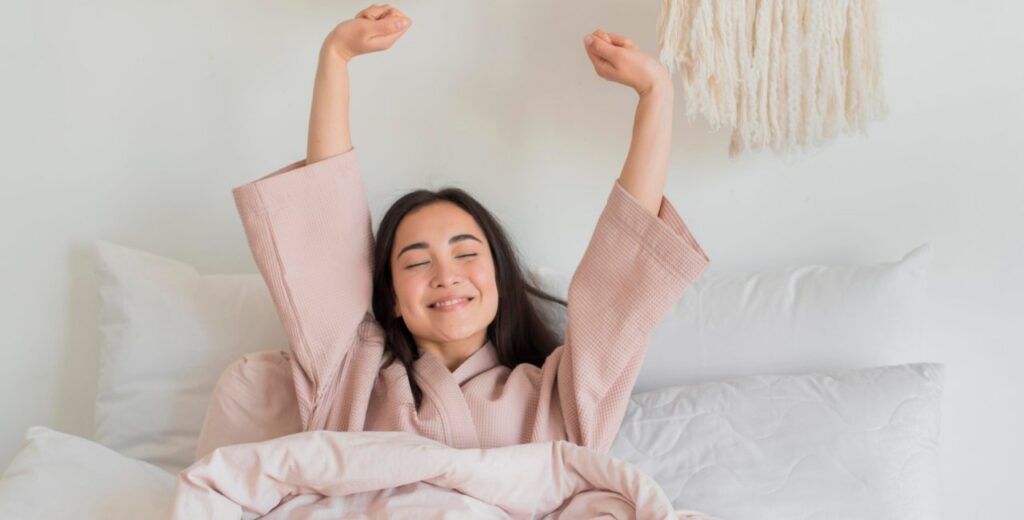
Chronotype
If you’ve ever described yourself as a “night owl” or “early bird” you already know something about chronotypes and the study supports that this is absolutely something to build into your sleep strategy. In fact, the study went so far as to mention that those with the “night owl” or “evening chronotype” are associated with higher cognitive ability but don’t do as well as their morning counterparts in school. Then, should the night owl land a job with flexible hours, they suddenly flourish. It isn’t always possible to design our businesses around our chronotype but at least being aware of it can help us leverage tools like sleep banking and napping to offset when activities interfere with our sleep patterns.
Action item: Determine whether you are a morning or night person, if you don’t already know. In fact, there is even a chronotype quiz at this link operated by Dr. MIchael Breus (unrelated to the study) who says there are actually four chronotypes. Review your work schedule to see if you can bring it more in line with your natural sleep patterns. Where possible, schedule important tasks during your peak alertness periods and less critical tasks during your off-peak periods.
Self-Awareness Trumps Sleep Studies
Sleep, it turns out, is difficult to study with real-world applications. In fact, the study said that until recently, most of our knowledge comes from controlled studies of tens of participants – TENS! That’s hardly a representative sample. “Controlled” here means that people were intentionally sleep deprived to a specific extent and then given specific tasks or tests. While this is still helpful because it has taught us what factors (e.g., vigilance) are affected by sleep deprivation, the real-world implications and uses of the data are more complicated.
While studies conducted on sleep are informative, the models they create, according to the study, do not actually do a good job of predicting a given person’s response to a given sleep schedule. So, while the factors that affect sleep and what dials them up or down are useful, one person’s 5-hour fully restful night might be another person’s dangerous sleep deprivation. In fact, there is even a gene mutation (DEC2 mutation) which, when present seems to indicate the person is a natural short sleeper. So if you are or have ever met anyone claiming that 4 hours of sleep is plenty, they might be absolutely right – for them.
Action Item: Select items from this article (or elsewhere) to start tracking with regard to your sleep and learn your brain and body and how it responds to situations and stimuli so you can optimize what works best for you.
Wrap Up
Sleep is something that we are continuously learning more about and the reviewed study by Ruth L.F. Leong and Michael W.L. Chee challenges the common belief that everyone needs 8 hours of sleep. Instead, the “right sleep,” which varies for each individual, could be more beneficial. More than following general prescriptions, understanding personal sleep patterns and needs is more beneficial to entrepreneurs as are strategies like light control, napping, and sleep banking over weekend catchups. While adjusting our sleep schedule can be a challenge, the action items in this article should help give you some strategies you can try to implement to adjust your sleep and/or adjust your work to your sleep.


